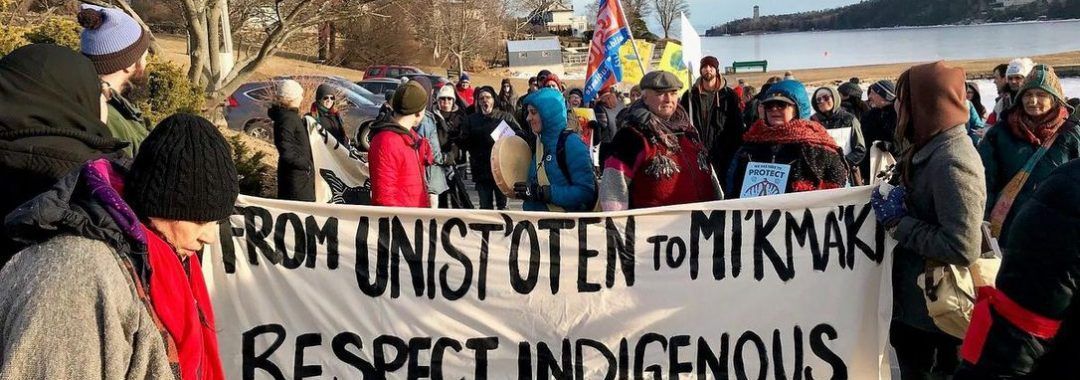Carlo Mosti is a member of Alternative Socialiste (ISA in Quebec).
from Alternative Socialiste Québec
The “railway crisis,” as journalists called it, was a new wave of First Nations against Canadian neo-colonial capitalism. This time, the blockades had paralyzing effects on the economy of some provinces comparable to a transportation strike.
The bosses, worried about profits, demanded that their political elites did something. Many journalists echoed these demands, calling for a return to social peace, demanding respect for the rule of law (inaccurately), and claiming that consumers were being held hostage.
The enemies show their true face
The struggle of the Wet’suwet’en Nation brings to light the faces of First Nations’ class enemies. First there are the federal politicians who demanded that Prime Minister Justin Trudeau to lift the blockades as soon as possible. For the Conservatives and the Bloc Québécois, the federal government must ensure that the development of pipeline projects is out of the control of the communities. In the end, the Liberals are defending the same polluting extractive policies as the Conservatives, even with their reconciliation speech with the First Nations.
The provinces also have their hypocrisy. The Coalition avenir Québec (CAQ) and the Parti Québécois (PQ), so vocal in refusing federal interference in Quebec’s current affairs, begged the federal government to put an end to the national blockades. In British Columbia, the New Democratic Party government opposes the Trans Mountain project, while giving large subsidies to the Coastal GasLink project. It passes the United Nations Declaration on the Rights’ of Indigenous Peoples (UNDRIP) but supports the Royal Canadian Mounted Police’s (RCMP) invasion of Indigneous territories.
Federal Hypocrisy
Since being elected, the Trudeau government has been promising a change in attitude toward First Nations. But now, this government, like all the previous ones, clearly supports an extractivist economy. It does not intend to be blocked in its path by First Nations, nor by anyone, reconciliation or not. Nevertheless, it probably did not think it would be confronted with the determination of Indigenous nations across the country, ready to take on the arrogance and hypocrisy of the Canadian government.
This arrogance was the trigger for the resumption of the fight to defend their territory and identity. And this time they will not accept half measures. The Band Council Chief Serge Simon of Kanesatake was roundly rebuked for daring to suggest that the blockades be lifted. Kanesatake citizens have said that they will not make the same mistake they made during the Oka crisis: they will stand up and show solidarity until the demands of the Wet’suwet’en are fully respected. The first claim on which the Wet’suwet’en remain intractable is the removal of the RCMP from their territory.
Internal contradictions
The rail blockades by various Indigenous communities across Canada have highlighted a fundamental contradiction within them. There is a gap between the popular will expressed by hereditary chiefs and that of band councils, a creation of the federal government and its Indian Act.
The Wet’suwet’en, through the majority of its hereditary chiefs, is fighting in BC against the construction of a gas pipeline by the Coastal GasLink company. The Wet’suwet’en denounces the fact that a construction project on its ancestral lands will be started without its consent, in addition to presenting environmental risks. However, along the pipeline route to Kitimat, several band council chiefs have signed an agreement with Coastal GasLink. They have tried to convince their communities that this is a good deal to improve their economic situation.
The traditional chiefs, who were not consulted, do not see it in the same way. They are strongly opposed to this agreement. The federal government has thus violated its own policies of consultation and consent with First Nations. On the one hand, the government is keeping these Indigenous peoples in misery through the Indian Act and gross underfunding on reserves. On the other hand, it promises them better economic health if they comply with the demands of Canada’s extractive industries.
Interview with Stone Iwaasa
Alternative Socialiste spoke with activist Stone Iwaasa. Born in Alberta and established in Montreal for 45 years, he has taught at UQAM in the communications department. He maintains excellent relations with the traditional Mohawk clan of Kahnawake. He has written a very interesting article on the Aboriginal knowledge system. Mobilized on environmental issues and the freedom of peoples, Iwaasa shared his thoughts on the recent railway blockades in solidarity with the Wet’suwet’en Nation.
AS: What role do traditional clans still play in the community today?
Stone Iwaasa: If we take the example of the tobacco industry, what it creates as a division among Mohawks, those who still have traditional values do not want this industry to create wealthy social classes in their community. They want the wealth to be shared. When money comes in for some people, it disconnects them from their tradition and their identity. Large sums of capital end up corrupting and creating division. It’s fortunate that traditional clans are very disciplined not to fall into the trap and also inspire groups that come from outside the Mohawk community. They have already succumbed to this kind of problem and want to use this discipline to control the influence of money in their society.
AS: What do you think of those who oppose the blockades in the country?
SI: The poor citizen who is in danger of losing his or her job is certainly unfortunate. But there are Indigenous people who have given up their jobs because they had to protect their land. There has to be solidarity before, during and after between everyone. There is a way to help each other, even afterwards, on the issue of job creation. With new technologies to correct the damage caused to the environment, powered by energies such as wind and solar power, there are opportunities for a lot of people to have better jobs, keeping in mind that the new way of doing things is an economy that respects the environment. Even among the Wet’suwet’en, some people have thought about taking jobs in the oil industry because the band councils told them it was good for the community. But the real guardians of the land, the traditional clans, warned them of the consequences of following a political entity that is a creation of the federal government at the service of capital.
AS: How do the different nations, from coast to coast, manage to establish today the bonds of solidarity that have made it possible to create these chain of blockades?
SI: Communication is always possible between the different nations, but it is the work of maintaining this communication that is problematic and does not last over time. When there is a crisis, the links are rebuilt because it affects the communities more seriously. And they do manage to re-establish contact, even though the realities of the different nations in Canada can create certain differences between them. Defending the land means defending their identity, because Indigenous people are intimately connected to their ancestral territory. But it also means defending the interests of all, because the land is for all people. But when the crisis subsides, unfortunately the commitment to this struggle fades with it and we let our guard down. That is the whole problem. There are people across Canada, like Stuart Myiow (spokesperson for the traditional Wolf Clan at Kahnawake), who are active all the time and are on the lookout for news to activate people on the ground when it is time to act.
- For the withdrawal of the RCMP from the Wet’suwet’en territory!
- For the release of all those arrested and the dropping of all charges!
- For the cancellation of the Coastal Gaslink pipeline project!
- For the massive creation of public and unionized clean energy jobs to replace fossil fuel jobs!
Capitalist “reconciliation”
The Trudeau government promises “reconciliation” with First Nations. In concrete terms, this would mean that Indigenous nations would regain their political independence and be able to choose the political system that represents them, rather than having a federally created structure (band councils) imposed on them. True reconciliation would involve the replacing the infamous Indian Act, which keeps First Nations in a state of dependency.
This act enshrines both their status as subordinates of the federal government and the respect of treaties on their ancestral territories. However, abolition would open the door to the privatization of all Indigenous lands and would be the road to destruction Indigenous culture and society. As a result, many Indigenous people oppose abolishing the Indian Act.
Control of land is at the centre of ever interaction between the Canadian state and Indigenous people. The state wants the land to allow extraction of resources. This is also why former Prime Ministers Stephen Harper and Pierre Trudeau proposed abolishing the Act, under the guise of a supposed respect for First Nations. Basically, they wanted to remove the last barriers to the advancement of mines, pipelines and other projects.
Treaty or no treaty, private companies want to dig into the bowl of candy right now, without any pitfalls. Respect for ancestral lands is the least of their worries. Beyond this respect, it is a matter of stopping the occupation, usurpation and exploitation of Indigenous nations and territories. It is about stopping the violation of their fundamental rights and the destruction of the environment.
ALTERNATIVE SOCIALIST defends :
- First Nations self-determination, including the right to separation.
- A free and voluntary socialist federation of peoples and nations within the territory of the Canadian state.



